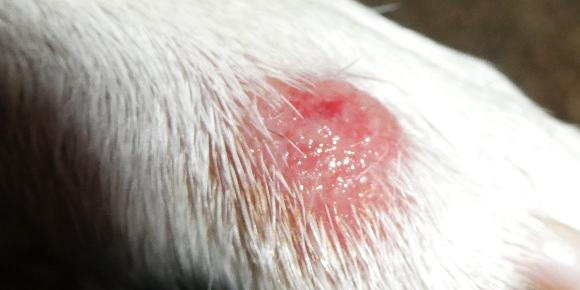What the Heck is a Hot Spot?

- posted: Sep. 22, 2019
What the Heck is a Hot Spot?
Late summer and early fall are still prime time for allergies in our dogs and cats. Dogs can also be prone to what are commonly known as “hot spots.” But what exactly is a hot spot?
A hot spot refers to a moist bacterial infection on the skin, often caused by self-trauma, meaning the dog licks or scratches the skin leading to a secondary infection. The underlying cause of what makes the dog itchy in the first place can vary—sometimes it is a minor injury such as a small cut, sometimes the dog is scratching his ears due to an ear infection and causes a hot spot on the side of the face or sometimes there is an underlying flea allergy or seasonal allergy causing a pet to scratch and damage her skin.
Whatever the underlying cause, constant licking and scratching due to intense itching removes the hair and causes the surface of the skin to become damaged. Bacteria normally found on the skin such as staph soon move in and cause an infection. A classic hot spot is usually a hairless area of skin that is bright red with a moist yellow exudate on the skin surface which may eventually form a thick sticky or dry crust. Hot spots may initially be quite small, but they can quickly become large as the dog continues to lick and scratch the skin. A dog may have one or more hot spots on her skin and, Golden Retrievers seem to be the most commonly affected breed though any dog can develop a hot spot. They are also more common in hot, humid weather. Hot spots are not considered to be contagious.
What should you do if your dog has a hot spot? Small hot spots may be treated at home by clipping away surrounding hair, cleaning the hot spot with a mild antiseptic or medicated shampoo and applying an antibiotic spray or cream to the site. Preventing your dog from continuing to lick the site is also important to make sure it does not get worse so use of an E-collar or similar device may be necessary. If the hot spot is large or not responding to home treatment after 24hs (they can rapidly spread and go from bad to worse in a very short time), seek veterinary care for your pet. While not usually serious, hot spots can be quite painful. Most will require a clip and clean of the site, antibiotics and medications like apoquel or prednisone to control itching in order to heal.
This blog brought to you by the Patton Veterinary Hospital serving Red Lion, York and the surrounding communities.
http://www.veterinarypartner.com/Content.plx?P=A&S=0&C=0&A=2714&EVetID=3003408
Schedule an appointment with our team of veterinarians today at (717) 246-3611!
Location
Patton Veterinary Hospital
425 E Broadway
Red Lion, PA 17356
